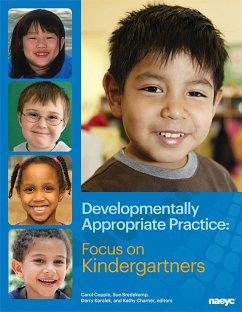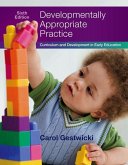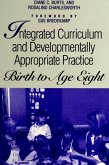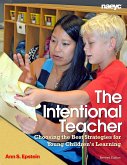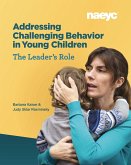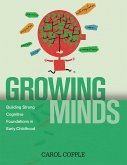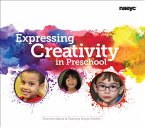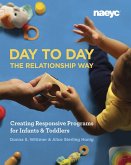Developmentally Appropriate Practice
Herausgeber: Copple, Carol; Koralek, Derry; Bredekamp, Sue
Developmentally Appropriate Practice
Herausgeber: Copple, Carol; Koralek, Derry; Bredekamp, Sue
- Broschiertes Buch
- Merkliste
- Auf die Merkliste
- Bewerten Bewerten
- Teilen
- Produkt teilen
- Produkterinnerung
- Produkterinnerung
Edited and compiled just for kindergarten teachers, this resource explains developmentally appropriate practice (DAP) so teachers can apply DAP in their work with kindergartners. Chapters include: What Is Developmentally Appropriate Practice?; A brief introduction to the main ideas of DAP; Connecting DAP to excellent teaching; and An Overview of Development in the Kindergarten Year.
Andere Kunden interessierten sich auch für
![Developmentally Appropriate Practice Developmentally Appropriate Practice]() Carol GestwickiDevelopmentally Appropriate Practice289,99 €
Carol GestwickiDevelopmentally Appropriate Practice289,99 €![Integrated Curriculum and Developmentally Appropriate Practice Integrated Curriculum and Developmentally Appropriate Practice]() Integrated Curriculum and Developmentally Appropriate Practice44,99 €
Integrated Curriculum and Developmentally Appropriate Practice44,99 €![The Intentional Teacher The Intentional Teacher]() Ann S EpsteinThe Intentional Teacher43,99 €
Ann S EpsteinThe Intentional Teacher43,99 €![Addressing Challenging Behavior in Young Children: The Leader's Role Addressing Challenging Behavior in Young Children: The Leader's Role]() Barbara KaiserAddressing Challenging Behavior in Young Children: The Leader's Role33,99 €
Barbara KaiserAddressing Challenging Behavior in Young Children: The Leader's Role33,99 €![Growing Minds Growing Minds]() Growing Minds27,99 €
Growing Minds27,99 €![Expressing Creativity in Preschool Expressing Creativity in Preschool]() Expressing Creativity in Preschool27,99 €
Expressing Creativity in Preschool27,99 €![Day to Day the Relationship Way Day to Day the Relationship Way]() Donna S WittmerDay to Day the Relationship Way38,99 €
Donna S WittmerDay to Day the Relationship Way38,99 €-
-
-
Edited and compiled just for kindergarten teachers, this resource explains developmentally appropriate practice (DAP) so teachers can apply DAP in their work with kindergartners. Chapters include: What Is Developmentally Appropriate Practice?; A brief introduction to the main ideas of DAP; Connecting DAP to excellent teaching; and An Overview of Development in the Kindergarten Year.
Hinweis: Dieser Artikel kann nur an eine deutsche Lieferadresse ausgeliefert werden.
Hinweis: Dieser Artikel kann nur an eine deutsche Lieferadresse ausgeliefert werden.
Produktdetails
- Produktdetails
- Verlag: National Association for the Education of Young Children
- Seitenzahl: 192
- Erscheinungstermin: 1. April 2014
- Englisch
- Abmessung: 277mm x 213mm x 15mm
- Gewicht: 544g
- ISBN-13: 9781938113031
- ISBN-10: 1938113039
- Artikelnr.: 41480709
- Herstellerkennzeichnung
- Libri GmbH
- Europaallee 1
- 36244 Bad Hersfeld
- gpsr@libri.de
- Verlag: National Association for the Education of Young Children
- Seitenzahl: 192
- Erscheinungstermin: 1. April 2014
- Englisch
- Abmessung: 277mm x 213mm x 15mm
- Gewicht: 544g
- ISBN-13: 9781938113031
- ISBN-10: 1938113039
- Artikelnr.: 41480709
- Herstellerkennzeichnung
- Libri GmbH
- Europaallee 1
- 36244 Bad Hersfeld
- gpsr@libri.de
Carol Copple is a highly respected early childhood education author, educator, and consultant. For 16 years she served as a senior staff member at NAEYC, and her responsibilities included directing the books program. She has taught at Louisiana State University and the New School for Social Research, and she codeveloped and directed a research-based model for preschool education at the Educational Testing Service. With Sue Bredekamp, Carol is coeditor of Developmentally Appropriate Practice in Early Childhood Programs (1997; 2009). Among her other books are Learning to Read and Write: Developmentally Appropriate Practices for Young Children (NAEYC); Growing Minds: Building Strong Cognitive Foundations in Early Childhood (NAEYC); and Educating the Young Thinker: Classroom Strategies for Cognitive Growth (Lawrence Erlbaum). She received her doctorate from Cornell University. Sue Bredekamp is an early childhood education specialist from Washington, DC. She serves as a consultant on developmentally appropriate practice, curriculum, teaching, and professional development for many state and national organizations, including NAEYC, the Council for Professional Recognition, Head Start, and Sesame Workshop. From 1981 to 1998, she was director of accreditation and professional development for NAEYC. Sue is the primary author of the 1987 edition of Developmentally Appropriate Practice in Early Childhood Programs, and coeditor (with Carol Copple) of the 1997 and 2009 revisions. She is the author of the introductory textbook Effective Practices in Early Childhood Education: Building a Foundation, 2nd Edition (Pearson). Sue was a member of the National Research Council’s Committee on Early Childhood Mathematics, and she holds a PhD in curriculum and instruction from the University of Maryland. Derry Koralek, chief publishing officer of NAEYC, oversees the development of all print and digital publishing, including books, brochures, periodicals, professional development guides, posters, and websites for educators and families. Derry is editor in chief of Young Children and TYC—Teaching Young Children. Kathy Charner is editor in chief of NAEYC’s Books and Related Resources department, with responsibility for the content, management, publication, and general excellence of the books and brochures published by NAEYC. Before joining NAEYC, Kathy was editor in chief at Gryphon House for more than 20 years.
* About the Editors
* Acknowledgments
* Editors' Preface
* Foreword
* 1. What Is Developmentally Appropriate Practice?
* Meeting Children Where They Are
* Helping Children Reach Challenging and Achievable Goals
* 2. Teaching in the Kindergarten Year
* Implementing Curriculum in the Kindergarten Year
* Knowing the Children
* Building a Classroom Community
* Establishing a Structure for the Classroom
* Guiding Children's Learning
* Assessing Children's Learning
* Building a Partnership With Families
* 3. An Overview of Development in the Kindergarten Year
* Physical Development
* Social and Emotional Development
* Cognitive Development
* Language and Literacy Development
* Easing the Transition Into and Out of Kindergarten
* 4. Developmentally Appropriate Examples to Consider
* Creating a Caring Community of Learners
* Teaching to Enhance Development and Learning
* Planning Curriculum to Achieve Important Goals
* Assessing Children's Development and Learning
* Establishing Reciprocal Relationships With Families
* 5. The Common Core State Standards and Developmentally Appropriate
Practices: Creating a Relationship
* What the Common Core Is, and What It Is Not
* A Closer Look-The Common Core State Standards for Kindergarten
* From What to How: Implementing the Common Core
* Taking Action-For Yourself, Young Children, and Others
* Online Resources for the Common Core State Standards
* 6. Young Children Articles
* Integrating Science Inquiry With Reading and Writing in Kindergarten
* Young Authors: Writing Workshop in Kindergarten
* Humpty Dumpty and Rosa Parks: Making Space for Critical Dialogue With
5- and 6-Year-Olds
* The Inside-Out Project: Illustrating the Complexity of Relationships
in Kindergarten and First Grade
* Joyful Learning and Assessment in Kindergarten
* Learn to Say Yes! When You Want to Say No! to Create Cooperation
Instead of Resistance: Positive Behavior Strategies in Teaching
* Family Involvement: Challenges to Consider, Strengths to Build On
* Classroom Bird Feeding: Giving Flight to the Imaginations of 4- and
5-Year-Olds!
* References
* Acknowledgments
* Editors' Preface
* Foreword
* 1. What Is Developmentally Appropriate Practice?
* Meeting Children Where They Are
* Helping Children Reach Challenging and Achievable Goals
* 2. Teaching in the Kindergarten Year
* Implementing Curriculum in the Kindergarten Year
* Knowing the Children
* Building a Classroom Community
* Establishing a Structure for the Classroom
* Guiding Children's Learning
* Assessing Children's Learning
* Building a Partnership With Families
* 3. An Overview of Development in the Kindergarten Year
* Physical Development
* Social and Emotional Development
* Cognitive Development
* Language and Literacy Development
* Easing the Transition Into and Out of Kindergarten
* 4. Developmentally Appropriate Examples to Consider
* Creating a Caring Community of Learners
* Teaching to Enhance Development and Learning
* Planning Curriculum to Achieve Important Goals
* Assessing Children's Development and Learning
* Establishing Reciprocal Relationships With Families
* 5. The Common Core State Standards and Developmentally Appropriate
Practices: Creating a Relationship
* What the Common Core Is, and What It Is Not
* A Closer Look-The Common Core State Standards for Kindergarten
* From What to How: Implementing the Common Core
* Taking Action-For Yourself, Young Children, and Others
* Online Resources for the Common Core State Standards
* 6. Young Children Articles
* Integrating Science Inquiry With Reading and Writing in Kindergarten
* Young Authors: Writing Workshop in Kindergarten
* Humpty Dumpty and Rosa Parks: Making Space for Critical Dialogue With
5- and 6-Year-Olds
* The Inside-Out Project: Illustrating the Complexity of Relationships
in Kindergarten and First Grade
* Joyful Learning and Assessment in Kindergarten
* Learn to Say Yes! When You Want to Say No! to Create Cooperation
Instead of Resistance: Positive Behavior Strategies in Teaching
* Family Involvement: Challenges to Consider, Strengths to Build On
* Classroom Bird Feeding: Giving Flight to the Imaginations of 4- and
5-Year-Olds!
* References
* About the Editors
* Acknowledgments
* Editors' Preface
* Foreword
* 1. What Is Developmentally Appropriate Practice?
* Meeting Children Where They Are
* Helping Children Reach Challenging and Achievable Goals
* 2. Teaching in the Kindergarten Year
* Implementing Curriculum in the Kindergarten Year
* Knowing the Children
* Building a Classroom Community
* Establishing a Structure for the Classroom
* Guiding Children's Learning
* Assessing Children's Learning
* Building a Partnership With Families
* 3. An Overview of Development in the Kindergarten Year
* Physical Development
* Social and Emotional Development
* Cognitive Development
* Language and Literacy Development
* Easing the Transition Into and Out of Kindergarten
* 4. Developmentally Appropriate Examples to Consider
* Creating a Caring Community of Learners
* Teaching to Enhance Development and Learning
* Planning Curriculum to Achieve Important Goals
* Assessing Children's Development and Learning
* Establishing Reciprocal Relationships With Families
* 5. The Common Core State Standards and Developmentally Appropriate
Practices: Creating a Relationship
* What the Common Core Is, and What It Is Not
* A Closer Look-The Common Core State Standards for Kindergarten
* From What to How: Implementing the Common Core
* Taking Action-For Yourself, Young Children, and Others
* Online Resources for the Common Core State Standards
* 6. Young Children Articles
* Integrating Science Inquiry With Reading and Writing in Kindergarten
* Young Authors: Writing Workshop in Kindergarten
* Humpty Dumpty and Rosa Parks: Making Space for Critical Dialogue With
5- and 6-Year-Olds
* The Inside-Out Project: Illustrating the Complexity of Relationships
in Kindergarten and First Grade
* Joyful Learning and Assessment in Kindergarten
* Learn to Say Yes! When You Want to Say No! to Create Cooperation
Instead of Resistance: Positive Behavior Strategies in Teaching
* Family Involvement: Challenges to Consider, Strengths to Build On
* Classroom Bird Feeding: Giving Flight to the Imaginations of 4- and
5-Year-Olds!
* References
* Acknowledgments
* Editors' Preface
* Foreword
* 1. What Is Developmentally Appropriate Practice?
* Meeting Children Where They Are
* Helping Children Reach Challenging and Achievable Goals
* 2. Teaching in the Kindergarten Year
* Implementing Curriculum in the Kindergarten Year
* Knowing the Children
* Building a Classroom Community
* Establishing a Structure for the Classroom
* Guiding Children's Learning
* Assessing Children's Learning
* Building a Partnership With Families
* 3. An Overview of Development in the Kindergarten Year
* Physical Development
* Social and Emotional Development
* Cognitive Development
* Language and Literacy Development
* Easing the Transition Into and Out of Kindergarten
* 4. Developmentally Appropriate Examples to Consider
* Creating a Caring Community of Learners
* Teaching to Enhance Development and Learning
* Planning Curriculum to Achieve Important Goals
* Assessing Children's Development and Learning
* Establishing Reciprocal Relationships With Families
* 5. The Common Core State Standards and Developmentally Appropriate
Practices: Creating a Relationship
* What the Common Core Is, and What It Is Not
* A Closer Look-The Common Core State Standards for Kindergarten
* From What to How: Implementing the Common Core
* Taking Action-For Yourself, Young Children, and Others
* Online Resources for the Common Core State Standards
* 6. Young Children Articles
* Integrating Science Inquiry With Reading and Writing in Kindergarten
* Young Authors: Writing Workshop in Kindergarten
* Humpty Dumpty and Rosa Parks: Making Space for Critical Dialogue With
5- and 6-Year-Olds
* The Inside-Out Project: Illustrating the Complexity of Relationships
in Kindergarten and First Grade
* Joyful Learning and Assessment in Kindergarten
* Learn to Say Yes! When You Want to Say No! to Create Cooperation
Instead of Resistance: Positive Behavior Strategies in Teaching
* Family Involvement: Challenges to Consider, Strengths to Build On
* Classroom Bird Feeding: Giving Flight to the Imaginations of 4- and
5-Year-Olds!
* References

